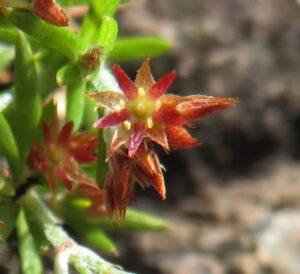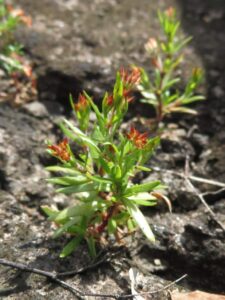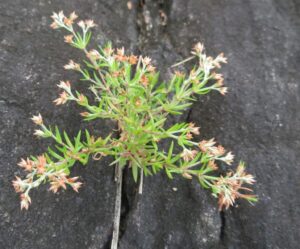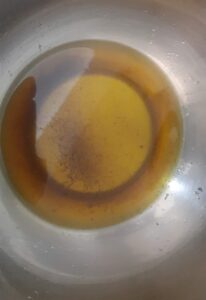Polycarpaea Corymbosa
A plant seen on rocky tops of Nagalassery Hills. It can be used as a source of Parpataka. In Siddha, it is considered as Parpataka. It is having Kshaya rasa predominance.
Botanical name: Polycarpaea corymbosa
Family: Caryophyllaceae (Carnation family)
Synonyms: Kattu-mailochana, Akkaram kolli, Acharam kolli, Akkara poode, Paarappovu etc.
- Oldman’s Cap is a weed of sandy soils in open woodland and grassland, and of cultivated ground.
- It is an erect annual herb, usually unbranched.
- Leaves are opposite or appear in whorls, linear up to 3.5 cm long with a bristle at the tip.
- Flowers are borne in compact heads at the end of stems. Sepals are silvery white, turning rich brown with age. Petals are small, pink to orange.
- Fruit is a minute ellipsoid capsule.
- Flowering: August-September.
Therapeutic uses
- Crushed and mixed with coconut milk for snake venom
- Kashaya is good for diseases occur due to fear or tension etc.
- In our institution, we made a kera ksheera ghritam with its kalkam and coconut milk. The oil obtained found effective in non-healing ulcers. Its kalka, obtained after cooking is found to be effective in gastritis also.
- It was added in certain taila yogas and found to be very effective in oozing types of skin diseases.
By,
Prof. Dr. Ajayan Sadanandan MD(Ayu), PhD
Head – Ayurveda Ethno Medico Botanical Team
Ashtamgam Ayurveda Chikitsalayam & Vidyapeedham
Dr. Vipin S MD (Ay)
Assistant Professor
Dept. of Dravyagunavijnanam
And
Dr. Sreelakshmi U MD (Ay)
Assistant Professor
Dept. of Rasashastra & Bhaishajyakalpana








